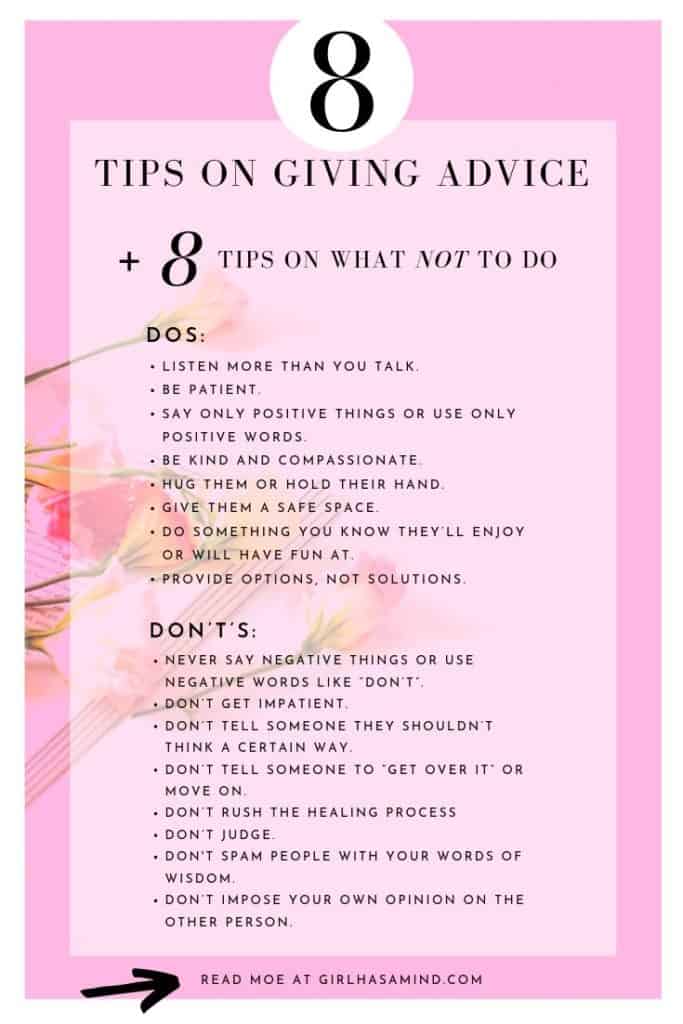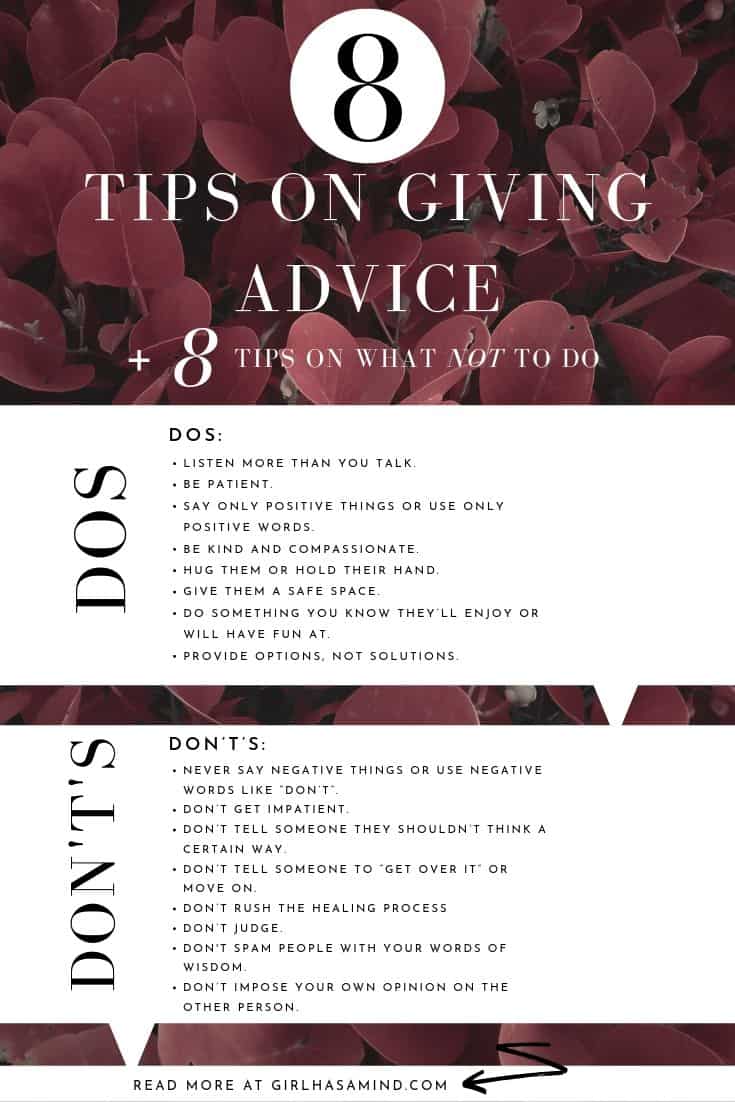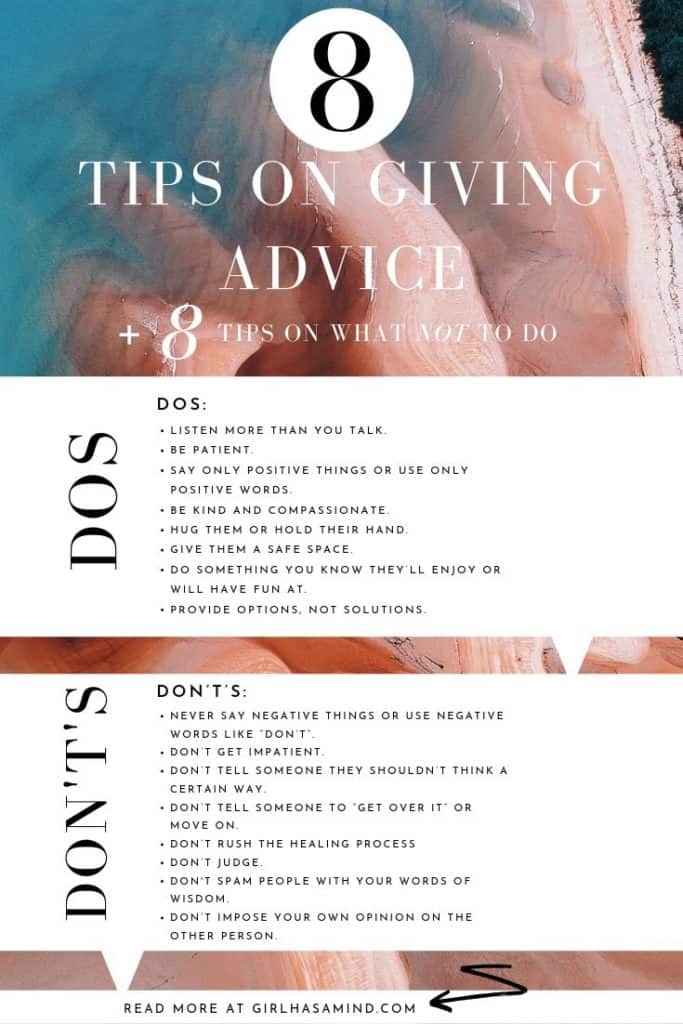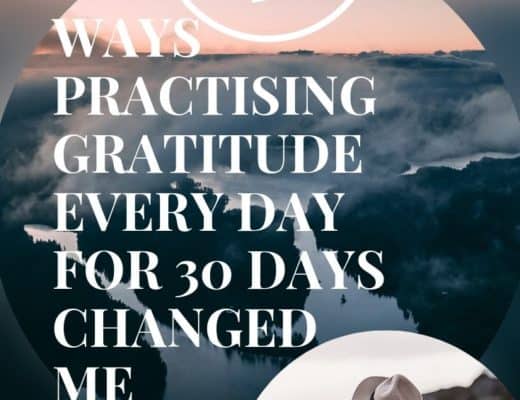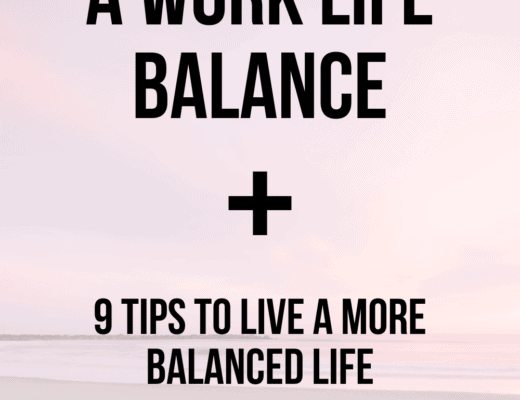When people care about us, they often can’t help giving advice when we have a problem. It can be annoying and frustrating, and let’s face it, COMPLETELY UNHELPFUL!
When someone I care about is going through a tough time, I just want them to come out of it, I want the bad time to be over as quickly as possible, I don’t like seeing them suffer and stress, it causes me to suffer and stress as well. I want them to be happy and calm and at peace, full of joy for the world.
Giving Advice…NOOOO!!!!!
Often, this anxiety on my part for my friend, will translate into GIVING ADVICE. If only you do xyz your problem will be over and you can relax again. If only you spoke to xyz and told them abc, your problem will be over and you can relax again. If only you cut this person out of your life, or move to another city, or get a new job, or do one of many other things, your problem will be over and you can return to “normal” life.
The problem with giving advice is that it’s seldom helpful. Things that worked for me won’t necessarily work for my friend, we live different lives. Also, by giving advice and hastening a conclusion, the other person can easily feel that I just don’t want to listen to their problems.
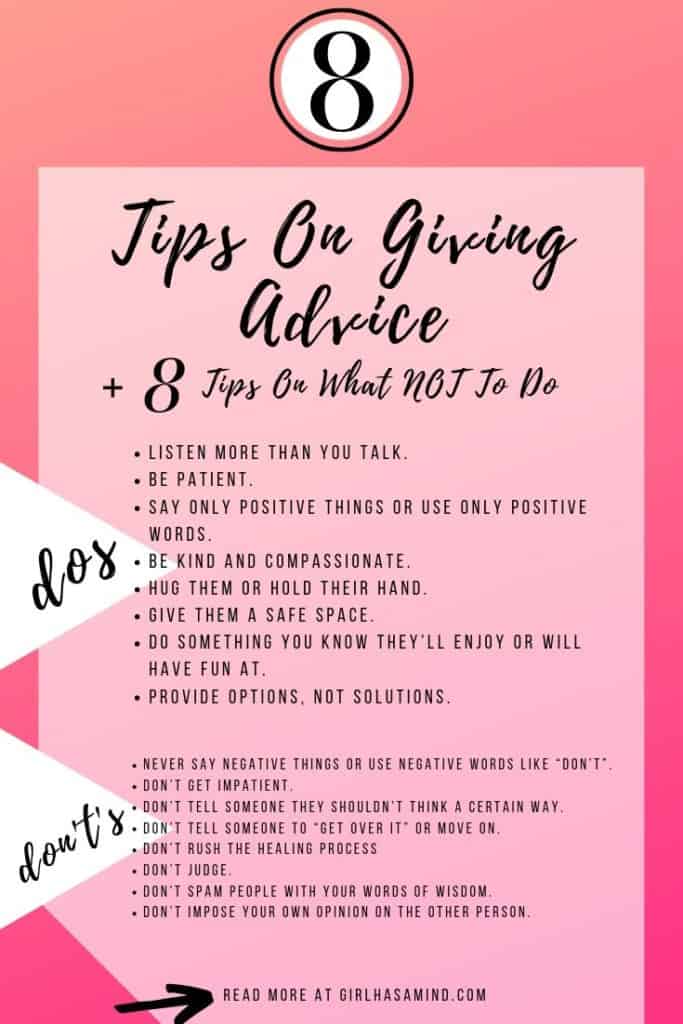
Give Them A Safe Space To Talk
I know for myself, having received advice in the past, that sometimes I just want to talk about something, I don’t need a solution, I really need a sympathetic ear. I want a sounding board so I can discuss my problem freely and without judgement until I can find a solution myself. The act of talking about it can be cathartic and when someone jumps right into giving advice, no matter how well intentioned, I feel like they just can’t be bothered with me and my problems, that they don’t want to listen, they’re too busy, or, on some occasions, that they simply don’t care about me.
This is often not true, as I have great friends and family who do care about my happiness and want me to have the best that life has to offer, but it certainly feels like that.
It has the side effect of shutting me up, pushing me away, until I feel that there’s no point in trying to have a discussion with someone as I won’t really get anything out of it.
Listen More Than You Say
Over the years I have come to the conclusion that the best way to support someone is not to give advice, but to merely listen. Only even ask questions, never give advice.
Bad Breakups And The Unhelpful Things People Say, When Trying To Help
For example, when a friend recently went through a very traumatic breakup with her boyfriend, a lot of people were giving unhelpful advice along the lines of “Just get over it”, “There are many fish in the sea”, “6 months from now you won’t even remember him”, “he doesn’t deserve you”, and my favourite “I never liked him anyway” (that was said to another friend who had been in a relationship for years, which made her question why no-one had said anything to her before).
Also read How The Practice Of Gratitude Made Me A Kinder, Better And More Likeable Person
Don’t Steal Someone’s Opportunity For Personal Growth
The problem is whatever wisdom you and I may have gained from our own past experiences, in this moment this person has their own experience to live through. They are growing and gaining in wisdom, learning new things about the world and themselves. You cannot hasten that process or fast track it or shortcut it. It is what it is and everyone has their own pace.
So yes, maybe all that advice is true, and accurate, but for this person right now, unhelpful, as they don’t yet have the experience to see the truth of that advice.
You Cannot Expect Someone To Simply Switch Off Their Feelings
But more importantly, we cannot simply turn off our emotions simply because we know the other person no longer loves us, or perhaps never loved us.
No advice has ever made anyone go, “Oh well, now I’m simply over it”. Your heart doesn’t work that way. It feels what it feels, you can’t simply switch it off just because you think it’s not helpful to your life. If you could, that would probably make you a psychopath or a robot, or something like that, in fact I can’t actually think of anything on this planet capable of having emotions and turning them off at will like a tap.
Pushing someone to quickly move past the emotions is like trying to tell them to stop breathing. It can’t really be done, so stop trying to do it, stop trying to FIX their life. You can’t, you are denying them an opportunity as a human being to grow and develop, gain wisdom and experience that no-one can take away from them. Let them have this, it will make them stronger and better.
So next time, instead of trying to fix things for them by giving advice, simply listen patiently, ask questions occasionally, and let them talk until they’ve examined the problem from every angle.
It takes time, so at first it might be more than you can bear, having to sit through yet another bottle of wine listening to your friend obsess over why so and so couldn’t love her.
Also read about the healing power of having FUN.
Good Advice Vs Bad Advice
The only advice you should ever give is to remind your friend that this is not her fault, she has not done anything wrong, there is nothing wrong with her, sometimes these things just happen regardless of anything you do. People fall in love with other people no matter how pretty, funny, intelligent or kind you are. Sometimes they just find that one person they feel more connected with than you and IT IS NOT YOUR FAULT.
Allowing Someone to Mourn
When my grandmother recently died, my mother was devastated, she felt so guilty that she left my grandmother in the hospital to go do laundry. My grandmother had been in hospital for 3+ weeks and every day my mother would spend the whole day at the hospital, making sure my grandmother took her pills, ate her food, had clean clothes, she would read her books, build puzzles with her, take her for walks in her wheelchair, help her with delicate tasks like going to the toilet or bath time, and she would do that ALL DAY LONG. She completely put my grandmother’s needs above her own to the most extreme level. I am proud of her for doing so, it is her mother after all, it is only natural that she is kind and generous towards her mother, but at the same time, I know she would do this even for people who don’t deserve this from her. One day, after my uncle had arrived to spend the day with my grandmother in the hospital, my mother left to take a day for herself, she even took my grandmothers laundry to get it cleaned. While driving she started getting phone calls but as she didn’t have a hands free kit she couldn’t answer until she arrived at her destination. By then there were multiple calls and voice mails begging her to come back to the hospital right now because my grandmother was dying, so she turned right around and went back. She was in time to see my grandmother while she was still alive, to hold her hand through those final moments, to whisper to her how much she loved her, that she was not alone, all her children where there.
She was still there when my grandmother gave her last breath and the machines went quiet. She was there for my uncle, her baby brother, who were inconsolable, she was there for everyone, taking care of everyone, and still she felt guilty for not doing enough.
Also read more about the Healing Power of Having FUN.
All I could do for her was listen when she was ready to talk, or cry. I would hug her and I would remind her of all the wonderful things she has done for my grandmother through the years, I would tell her that she is a wonderful person and my grandmother loved her dearly and thought very highly of her. But most of all I tried to impress on her to not be so hard on herself, that she was being complete unreasonable towards herself for not being there at a crucial moment (even though she was there at the end), and that feeling guilty or angry towards herself was extremely unfair and that my grandmother, her mother, would tell her not to think like that if she was here today. Then I would hug her tighter and listen some more, waiting patiently for her to deal with her emotions no matter how long it took.
I am not telling you this because I am the perfect daughter, far from it. Like my mother I feel guilty for not doing more, for living in a country far away so I couldn’t be there every moment she needed me. I’m sure she would tell that I was being unreasonable and that I shouldn’t be so hard on myself.
Don’t Criticise Someone’s Thoughts Or Their Way Of Thinking
I’m telling you this because if I had simply taken the obvious path blurting out that she had done nothing wrong and that she “shouldn’t think like that”, it would simply serve to make her go quiet. Instead of openly talking about her feelings and emotions and dealing with them, she would have bottled things up, letting it eat at her for the next few years.
When you give advice expressing that someone is wrong, that they are thinking wrong, that their thoughts are wrong, it is negative advice and will only serve to make them feel negative.
Give Positive Advice
Advice should only ever be positive, it should only ever be to remind the other person of all the good in their life, and all the amazing things they do or how wonderful a person they are. And most of all you should never talk more than the other person, they should do most of the talking while you do most of the listening.
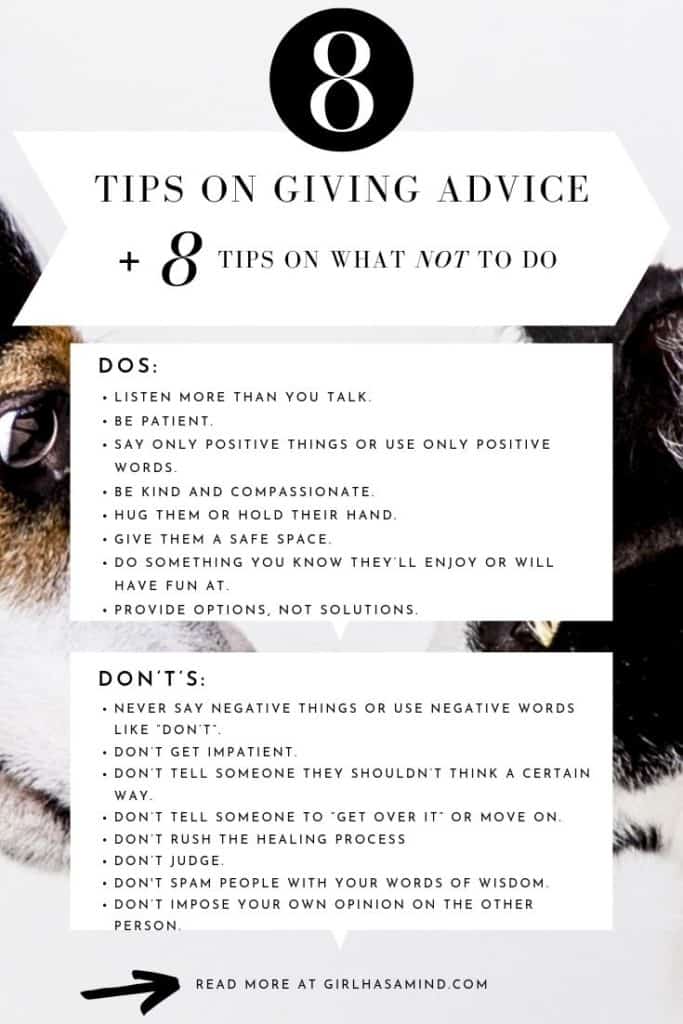
The Dos and Don’t’s of Giving Advice
Dos:
- Listen more than you talk.
Listen 90% and only talk 10%. - Be patient.
Let them deal with their grief at their own time. It’s different for every person. - Say only positive things or use only positive words.
Remind the other person of all the good things in their life, of all the good things they DO in life, remind them of their own generosity and kindness. - Be kind and compassionate.
Whatever you may think or feel about someone else’s problems, remember that for them this is an intense moment. Their feelings are deep and profound and it is causing them a great deal of trauma. Many of your problems might likely be viewed as inconsequential by others. We each deal with things differently. - Hug them or hold their hand.
Physical contact reminds us that the other person care. - Give them a safe space.
A space where they are not judged, where their secrets remain kept, where no-one laughs t them or blames them for anything. - Do something you know they’ll enjoy or will have fun at.
Making an effort will make the other person feel cared for. Keeping busy gives us less time to obsess over the bad things in our lives. Having fun is healing and reminds us that life goes on, and that there still is beauty in life. - Provide options, not solutions.
Help someone find their own way and their own solution. It will teach them that they can overcome bad situations, plus they will feel you care about them.
Also read: 75 Ways to help you deal with a Bad Breakup and 15 Ways Keeping a Gratitude Journal Changed My Life
Don’t’s:
- Never say negative things or use negative words like “don’t”.
When you say negative things it will make them feel negative - Don’t get impatient
Everyone has their own time for dealing with major life events. Everyone mourns in a different way. - Don’t tell someone they shouldn’t think a certain way.
You are simply reminding them they are “wrong” in some way. No-one will feel better with such advice. - Don’t tell someone to “get over it” or move on.
It is not possible to simply switch off your emotions just because they are not helpful. Humans cannot do this, don’t expect this of a friend. - Don’t rush the healing process
You will deny the other person the opportunity for personal growth. - Don’t judge.
It is not your place. You will simply make the other person feel like they are a bad human being full of failures and faults. - Don’t spam people with your words of wisdom.
This one is straight from Psychology Today and I had to add it because it’s so short and to the point. - Don’t impose your own opinion on the other person.
This one is from Nadia Goodman at Entrepreneur and I love how it accurately captures the mistake we make when we offer advice.
